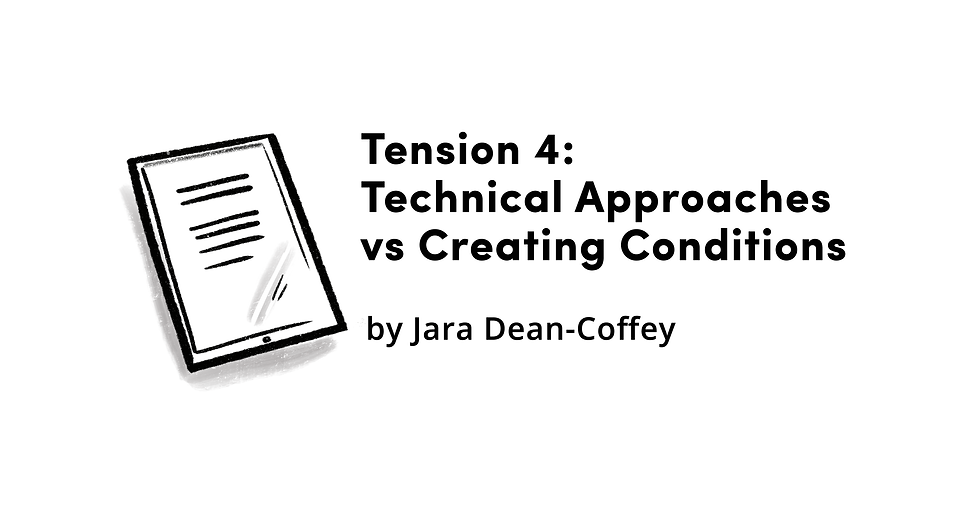Tension 3 - Individuals vs Organizations vs Systems
- Jara Dean-Coffey, MPH

- Aug 23, 2022
- 3 min read
Updated: Sep 15, 2022
Originally published on equitableeval.org on July 14, 2020
In my last post, I wrote about Tension 2 – Building a Thing vs Moving a Body of Work as part of a series on five tensions that I/we are struggling with as the Equitable Evaluation Initiative unfolds. In this post, I want to explore the tension between Individuals vs Organizations vs Systems.
Tension 3: Individuals vs Organizations vs Systems
First, I want to say that the use of “vs.” sets up a forced false choice. Humans are the common element across all three, and as such we must tend to the human condition in singularity but full of identities and intersections, in groups, organized and otherwise, and in the policies, practices, and processes which they (humans) embed in systems. We must tend in context - in this case, foundations and philanthropy (separate but related), with an understanding of culture. And we have to think about these in relationship to one another.
Individuals, organizations, and systems have an important role in shifting the evaluation paradigm. We tried to articulate this in our theory of change (yes, we have one) and design strategies and engagements with this in mind and to ensure that our evaluative efforts keep these things central. EEI is time-bound - 5 years total - and we are in the beginning of Year 2. This was deliberate. We know enough about the uptake of ideas (ideally ones that transform) and new practices that this amount of time is a meaningful benchmark. As with the project (2016-2017), if there is a reason for EEI to continue in some manner, the universe will tell it. But I am getting ahead of myself and the work.
Our 5-year window is combined with a field-focused orientation. This means we have to make choices. We must balance the desires and aspirations of individuals with the readiness, culture, and context of the organizations in which they sit. We have to understand and assess the relationship between the two and the likelihood of affecting the behaviors and systems which dictate or reinforce norms, often of the dominant culture. Our space is evaluation and evaluative practice in the 21st century, often focused on societal/environmental issues. We believe evaluative practice - the act of inquiry, sense-making, and action - is part of strategy and as such should hold to a set of principles that ensure that it is in service more than learning and accountability, it should be valid and transformational and if we (I) take it a bit further it should be a liberatory endeavor. We stepped through the looking glass of complicated to complex.
What have we learned so far:
When given the opportunity to tap in to (or back in to) their humanity, people are energized and activated to be and do different with regard to evaluation practices. (Individual)
An organizing and advocacy frame with the individual as the point of origin seems to resonate. Unseen possibilities and allies begin to surface. (Individual/Organization)
Something about evaluation (knowledge, evidence) trips up organizations who have done racial/equity work and they default back to the dominant paradigm. (Organization)
Most of the self-identified foundation people engaging with this paradigm shift are white and under 50. (Individual)
Most of the non-foundation people are of the global majority and under 40. (Individual)
Most EEI Partners (Investment and Practice) have commitments to equity or racial equity and see the Equitable Evaluation Framework ™ as a natural extension of interrogating all their practices and systems for alignment and integrity to their stated values and outcomes. (Individual/Organizations)
Funders are starting to regionally self-organize to support one another as they move towards adoption of the Equitable Evaluation Principles. (Organizations/Systems)
This work, at this stage, requires innovators and yet early and majority adopters are needed for the Equitable Evaluation Framework™ to embed and transform evaluative practice (Individual/Organization/System).
By no means do we have this figured out. We also don’t feel like we have to. This is OUR collective work – those who opt-in. We see ourselves as a platform. Our Practice Partner Portal that launched in February is a virtual space where we hope to touch the individual, to affect the organization to move the systems to shift the paradigm.





It is evident that balancing people, organisations, and systems is difficult, but it is compelling to observe how they all influence assessment and change collectively rather than independently. Real progress seems to depend on acknowledging these conflicts rather than imposing easy fixes.
Similar to how NFL Jacket Collection maintains a recognisable long-term style culture, strong identity and consistency are important everywhere.
I’ve been struggling a lot with my civil engineering projects and often feel overwhelmed by the complex calculations and designs. Finding reliable guidance has been tough, and deadlines make everything more stressful. That’s why I looked for Civil Engineering assignment help online to get some clarity and step-by-step understanding. It really helped me grasp difficult concepts better and manage my workload, making assignments less intimidating for students like me.
I offer Essay Writing Services UK through Global Assignment Help UK, helping students overcome academic challenges with high-quality, research-based essays. My focus is always on delivering work that’s original, understandable, and supports real learning.
Midnight Cry Evangelistic Ministry , founded in 1977, is a Christ-centered Ministry Church with a mission to reach the lost, strengthen believers, and prepare hearts for the Lord’s return. Through powerful preaching, dedicated Church Ministries, and a welcoming Church Hospitality Ministry, we create a place where faith grows and lives are transformed. Rooted in love, service, and truth, we invite you to join us in sharing the Gospel, building the body of Christ, and answering the Midnight Cry.